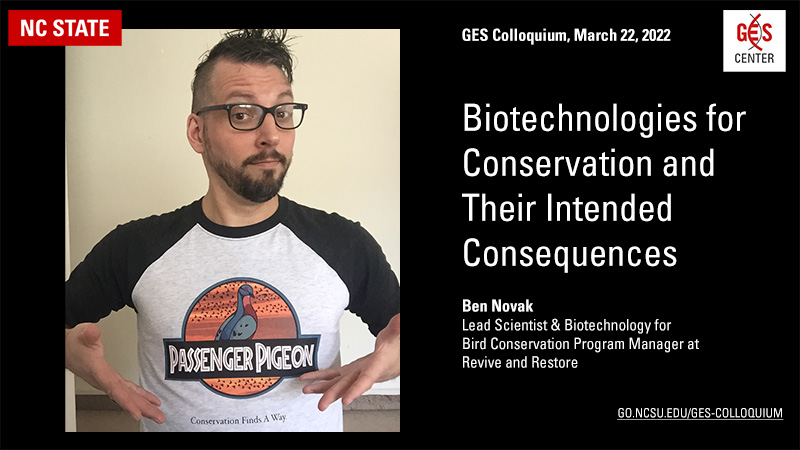
- This event has passed.
Ben Novak – Biotechnologies for Conservation and Their Intended Consequences | GES Colloquium
March 22, 2022 @ 12:00 pm - 1:00 pm

Colloquium Home | Zoom Registration | GES Video Library (current) | Video Archives | Podcast | @GESCenterNCSU | Newsletter
Biotechnologies for Conservation and Their Intended Consequences
Ben Novak, Lead Scientist & Biotechnology for Bird Conservation Program Manager, Revive and Restore
Revive & Restore’s “Intended Consequences” initiative aims at rebalancing the risk-benefit equation around the use of biotechnologies in conservation practices.
Ben Novak will be joining us in Poe 202 for an in-person conversation! Of course, folks are also welcome to join via Zoom.
Note, there will also be additional opportunities to meet with Ben. Please contact Jen Baltzegar and Sumit Dhole for more information (links below).
Abstract
Revive & Restore is a nonprofit conservation organization leading the effort to responsibly integrate biotechnologies into conservation practice. Over the past decade the Revive & Restore has been driving the development of a suite of biotechnologies termed “the 21st Century Genetic Rescue Toolkit,” spanning the use of genomics information and established technologies to enhance conservation strategies, to driving cutting edge gene-editing research to create new opportunities for recovery of species including facilitated adaptation to disease and climate change, and even recreating ecologically functional equivalents to extinct species for habitat and biodiversity restoration.
Many of the technologies and methods emerging for conservation spur controversy in both scientific and non-scientific publics. Most concerningly, there is a large degree of uncertainty among regulators and decision makers that will likely impede effective deployment of biotechnology solutions which many species urgently need. Ultimately, the future of conservation biotechnologies rests upon a diversity of stakeholders that will dictate when and which technologies are used.
Revive & Restore is spearheading “The Intended Consequences” initiative to promote a new paradigm that rebalances the risk-benefit equation when it comes to interventions to overcome the paralysis of the precautionary principle. The recent successful cloning of the first U.S. endangered species, the black-footed ferret, and its reception by conservationists, wildlife agency executive leadership, and the broader public signals a possible turning point for society’s readiness to embrace biotechnologies. In this talk I’ll share some of the technologies underlying the Genetic Rescue Toolkit, the early projects pioneering their applications, and the meaning of Intended Consequences for conservation and society.
Related links:
- Special Issue: Intended Consequences. Conservation Science and Practice. April 2021. https://conbio.onlinelibrary.wiley.com/toc/25784854/2021/3/4
(11 papers, letters, and reviews, with authors including Ben Novak, as well as GES faculty and previous colloquium speakers) - Genetic Rescue Toolkit, https://reviverestore.org/what-we-do/genetic-rescue-toolkit
- The Great Passenger Pigeon Comeback, https://reviverestore.org/about-the-passenger-pigeon/
Speaker Bio
Ben Novak’s primary passion is the restoration of the extinct passenger pigeon, the goal of Revive & Restore’s flagship project, The Great Passenger Pigeon Comeback. Ben’s mission in leading the Great Passenger Pigeon Comeback is to set the standard for de-extinction protocols and considerations in the lab, field, as well as sociopolitical and cultural spheres. While passenger pigeons are Ben’s passion and specialty, the conceptualization and advocation of biotech-based genetic rescue solutions for all organisms have been a lifelong pursuit. He earned a bachelor’s degree in Ecology and Evolution from Montana State University and a Masters of Arts in Ecology and Evolutionary Biology from University of California Santa Cruz.
GES Colloquium is jointly taught by Drs. Jen Baltzegar and Sumit Dhole, who you may contact with any class-specific questions. As conditions allow, colloquium will be held in-person in Poe 202, as well as live-streamed via Zoom (at least January will be 100% virtual). Please subscribe to the GES newsletter and Twitter for updates .